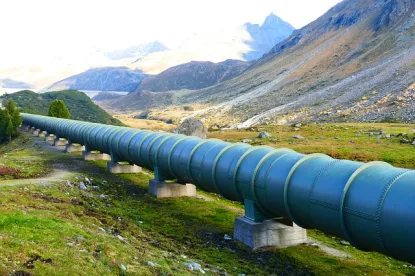The U.S. Court of Appeals for the District of Columbia Circuit recently issued orders in two similar proceedings in which interstate natural gas pipelines asked the court to order state or local agencies to act on the pipelines’ applications for permits required under federal environmental statutes. Jointly, these orders help provide paths to pipeline project developers when state and local agencies delay acting on requests for permits needed for pipeline construction and operation.
Both pipelines brought claims under a provision of the Natural Gas Act (the statute under which the Federal Energy Regulatory Commission (“FERC”) oversees interstate natural gas pipeline projects), which allows pipeline applicants to seek review before the D.C. Circuit when state or local agencies fail to act on requests for permits required under federal laws that are administered by such agencies. Certain federally-required permits administered by state agencies, such as permits under the Clean Water Act and Clear Air Act, are often the last permits that must be obtained for interstate pipeline projects that have already received a certificate of public convenience and necessity from FERC.
In Millennium Pipeline Co. v. Seggos, No. 16-1415, Millennium Pipeline Company, LLC (“Millennium”) filed a petition in the D.C. Circuit seeking to force a New York state agency to act on Millennium’s request for a water quality certification, required under Section 401 of the Clean Water Act, that would allow Millennium to construct its Valley Lateral Project. Millennium submitted its application with the state agency in November 2015, but almost 19 months later, the agency has still failed to act on Millennium’s application. Under the Clean Water Act, if a state fails to grant or deny the certificate “within a reasonable period of time (which shall not exceed one year) after receipt of [a] request,” the certification requirements “shall be waived.” 33 U.S.C. § 1341(a)(1). In December 2016, after over a year had passed since Millennium applied for its water quality certificate, Millennium asked the court to find that by virtue of its inaction, the New York agency had waived the requirement that Millennium receive a water quality certificate to construct its pipeline.
In the other case, Tennessee Gas Pipeline Co. v. Paul, No. 17-1048, filed in February 2017, Tennessee Gas Pipeline Co., LLC (“Tennessee Gas”) exercised the same right under the Natural Gas Act, but this time to address a local Tennessee agency’s failure to act on an application for several permits required under the Clean Air Act for construction and operation of a new natural gas compressor station in a small town outside of Nashville. The relevant provision of the Clean Air Act requires an agency to act on a permit application “within 18 months after the date of receipt thereof.” 42 U.S.C. § 7661b(c). After two years passed without the agency acting on the permit application, Tennessee Gas asked the D.C. Circuit to order the agency to take action.
On June 23, 2017, in Millennium Pipeline Co. v. Seggos, No. 16-1415, the D.C. Circuit dismissed Millennium’s petition, holding that the court’s intervention was not warranted because, if Millennium was correct and the New York state agency had waived its right to issue a water quality certification, Millennium could “bypass [the state agency] and proceed to obtain approval from FERC.”
While the dismissal of Millennium’s petition is technically a loss, the court’s opinion is a victory for the industry in that it clarifies that FERC can and should determine whether New York waived its right to issue a water quality certification for failing to act within a year. The court further explained that, by operation of Section 401 of the Clean Water Act, waiver of the water quality certification occurs after a year, and as such, the delay cannot injure Millennium: “Instead, the delay triggers the [Clean Water] Act’s waiver provision, and Millennium can present evidence of waiver directly to FERC to obtain the agency’s go ahead.” Slip op. 6-7. In addition, anticipating the New York agency’s argument that Millennium would still need a water quality certification from the agency to start construction, the court clarified that if FERC allows construction of the Project to proceed, the agency would lack the authority to stop it. Slip op. 8-9. New York’s only recourse in that case would be to seek judicial review of FERC’s construction authorization.
Days later, on June 29, 2017, the D.C. Circuit granted Tennessee Gas’s petition in Tennessee Gas Pipeline Co. v. Paul, No. 17-1048. Unlike the provision of the Clean Water Act relevant to Millennium, the Clean Air Act provision at issue for Tennessee Gas does not provide that the local agency’s failure to act by the statutory deadline waives the permitting requirement. As such, the agency’s failure to issue or deny Tennessee Gas’s application within 18 months violated the Clean Air Act, and the court remanded to require agency action. The court instructed the parties to submit a proposed schedule for action on remand, and “strongly urged” them to submit a joint proposal.
Implications
The two cases provide much-needed clarity regarding the options available to pipeline developers facing state or local agency delay in processing federal permit applications. Millennium Pipeline Co. v. Seggos provides a path forward for Millennium to ask FERC directly to find waiver of the Clean Water Act Section 401 water quality certification requirements. Tennessee Gas Pipeline Co. v. Paul demonstrates the court’s willingness to hold a delaying agency responsible for acting on a permit application where it believes it can grant relief. Ultimately, the question of whether to challenge an agency’s inaction before the court or at the FERC itself will vary depending on the text of the underlying federal statute that created the need for the state or local permit.






 />i
/>i
